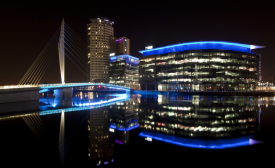international broadcasting
The best known – and, dare I say it, the most respected – example of public diplomacy broadcasting just ended. Did you notice? Don’t worry, you weren’t supposed to. You see, in April, after 75 years, the British government stopped directly funding the BBC World Service.

The best known example of public diplomacy broadcasting just ended. Did you notice?
Many Chinese fans of American television are feeling aggrieved. They cannot understand why their government is robbing them of even the small pleasures in life. Earlier this month, four US shows - The Big Bang Theory,The Good Wife, NCIS and The Practice - were removed from Chinese internet streaming sites on the censors' order. No reason was given.
The House is moving to overhaul the handful of taxpayer-funded media organizations, but critics say the changes would turn the Voice of America into a tool for pro-western propaganda. Last week, the House Foreign Affairs Committee unanimously passed a bill to make “dramatic reforms” to the Broadcasting Board of Governors (BBG), which oversees the government-backed outlets.
Qatar is launching a new television station as a political counterweight to Al Jazeera amid concern the network has become too supportive of the Muslim Brotherhood. The new station is to be an Arabic-language news channel based in London and broadcasting across the Arab world.
Viewed with the sound off, it appears on video to be a tour of a typical construction site in eastern Ukraine. But unmuted, the report by Russian TV host Arkady Mamontov becomes more ominous. As eerie music overlays the din of power drills, the camera zooms in on a tube protruding from a piece of brick wall and then quickly cuts to what appears to be a small shower room.
To commemorate World Press Freedom Day (May 3), reporters from around the globe, leaders of U.S. international media, and other staff of the Broadcasting Board of Governors today released an interactive presentation containing video testimonialsthat underscore the importance of press freedom.
U.S. lawmakers apparently now believe that the way to counter Russia's information offensive is by supplying propaganda of our own. The code for this is "messaging" -- in other words, the priority should be on "getting America's message out."







